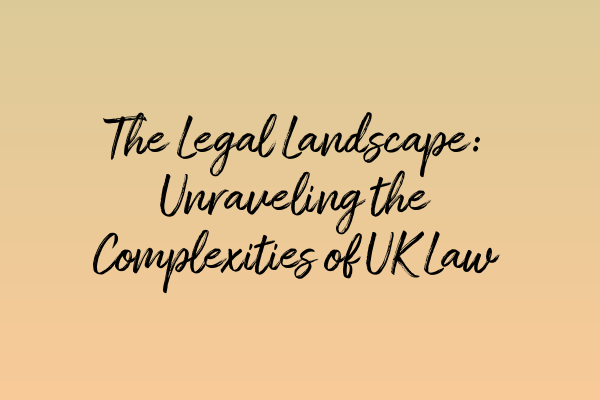The Legal Landscape: Unraveling the Complexities of UK Law
Understanding the intricate workings of the UK legal system can be a daunting task. With its rich history and complex legislative framework, navigating UK law requires expertise, precision, and a comprehensive understanding of its various branches and principles. In this blog post, we will delve into the depths of the legal landscape to unravel the complexities of UK law.
Before we dive in, let’s briefly touch upon the different areas of law that govern the UK’s legal system. These areas include criminal law, civil law, constitutional law, administrative law, and more. Each area serves a distinct purpose and plays a vital role in maintaining justice and order within society.
Criminal Law: Protecting Society and Enforcing Justice
Criminal law is perhaps the most well-known area of law, capturing the public’s attention through high-profile cases and gripping courtroom dramas. Its primary purpose is to safeguard society by defining criminal offenses, investigating crimes, and prosecuting offenders.
Private Prosecutions: Exploring Non-Governmental Prosecutions in Criminal Cases
Rights of the Accused: Protecting Individual Liberties in Criminal Proceedings
Magistrates’ Court vs Crown Court: Understanding Key Differences
Protecting Vulnerable Witnesses: Best Practices and Legal Safeguards
Unraveling the Complexities of UK Bail Laws: Understanding Key Differences
Civil Law: Resolving Disputes and Protecting Rights
Civil law, on the other hand, focuses on resolving disputes between individuals, organizations, or the state. It encompasses a wide range of areas, including contract law, family law, property law, and tort law. The aim of civil law is to ensure fairness, protect rights, and provide remedies to individuals who have suffered harm.
Within the realm of civil law, there are various legal processes and procedures that must be followed to seek justice. These include filing a lawsuit, gathering evidence, negotiating settlements, and potentially going to trial. It can be a complex and intricate process, requiring the guidance of a skilled solicitor to navigate effectively.
Constitutional Law: Safeguarding the Fundamental Structure
Constitutional law sets out the fundamental principles and rules by which a country is governed. In the UK, the constitution is largely unwritten, consisting of statutes, conventions, and court decisions. It establishes the structure of the government, outlines the powers and functions of different branches, and ensures the protection of individual rights and freedoms.
When constitutional issues arise, they often require interpretation and analysis by the courts. This ensures that the government and its institutions act within the bounds of the law and uphold the principles of democracy, accountability, and the rule of law.
By exploring the complexities of UK law, we gain a deeper understanding of our legal system’s intricacies and the importance of seeking professional legal advice when faced with legal issues or disputes. Whether it’s criminal law, civil law, or constitutional law, each area plays a crucial role in upholding justice and maintaining the fabric of our society.
So, the next time you find yourself in need of legal assistance, remember to seek the expertise of a qualified solicitor who can guide you through the complexities of UK law with professionalism, dedication, and a deep understanding of the legal landscape.


Leave a Reply